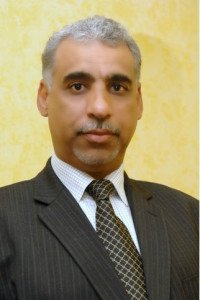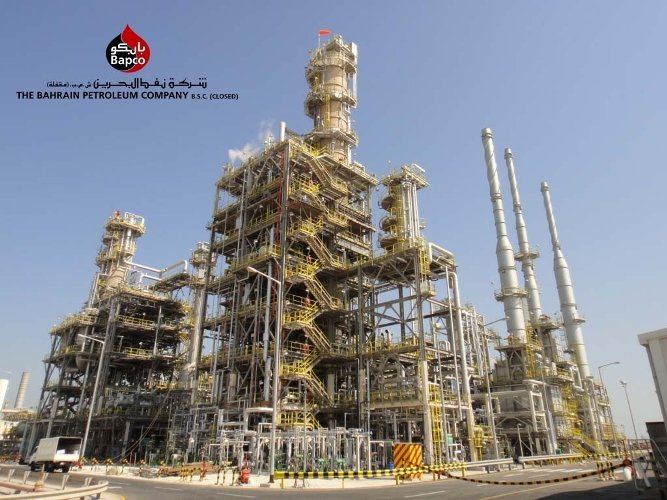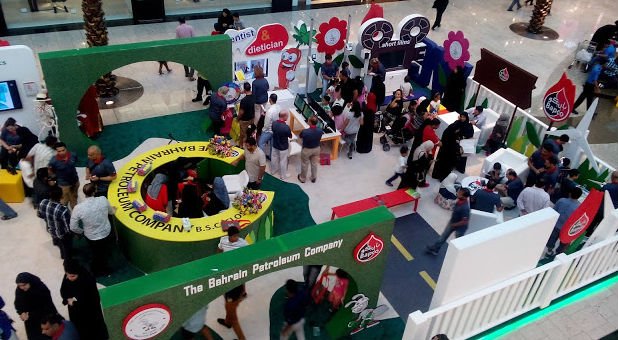Ahmed Khalil, director of health and safety at the Bahrain Petroleum company (Bapco), is one of the most experienced safety executives in the Gulf. Beginning his career as a fireman, Khalil has worked his way up the ranks and built one of the preeminent safety cultures in the region.
We sat down with Khalil to find out how this was achieved and what advice he has for safety professionals building a culture of safety.

“Being in Health and Safety is very satisfying” says Ahmed. “I go home when I see that we finished the day with no incidents/injuries of any kind.”
“If I go home knowing that we sent our employees home safe and sound without any of them suffering an injury, to me that’s an achievement.”
Getting started
Ahmed Khalil began his career at Bapco in the 80’s as a fireman and in that time has seen many changes.
“In those days we were extremely reactive. We didn’t have a clear plan on how we wanted to manage health and safety, there was not structure to it. We didn’t have the right competent resources to effectively manage H&S.”
This began to change in 1983 when a large fire destroyed part of the Bapco facilities.
“That’s when we thought ‘enough is enough’” Khalil recalls. “We needed to completely change our policy, which we did. Ever since then we have continued to improve our processes.”
“Now we’re extremely proactive. We always have a road map to where we want to go and our dream is to have an incident and injury free work environment – we want Bapco to have no accidents or injuries of any kind.”
“We have been looking at incidents that have happened around the world and seeing the lessons learnt from those incidents. We brought in experts to do assessments of our H&S systems, we’ve sought international certification. We do a lot of internal and external audits by expert companies from all over the world – we bring people in to help us identify gaps that might exist in our systems.”
Dealing with risk
Bapco has achieved over 12 million employee-hours without a lost-time incident, a number that Khalil describes as a “milestone” for the company. It is also the only oil refinery in Bahrain to have been awarded a 5-star rating by the British Safety Council.
“This does not happen by accident” Khalil explains.
“We’ve done a huge amount of work to make sure we continue to operate safely. It’s more than just a number, it means we are keeping our employees and contractors from harm.
Being a refinery, Bapco deals with many risks on a day-to-day basis: fire, explosion, people falling from heights, gas leaks, injuries and more. To help deal with these risks Khalil is very particular about the way he and his team conduct risk assessment and only use the best equipment.
“Risks we deal with could vary from a small cut because someone hasn’t used the right tools, to somebody falling off a chair, not closing the valve. We have invested heavily into making sure that none of these things I mentioned happen.”

Building a safety culture in Bahrain
Khalil has been exposed to a variety of safety cultures, having work with colleagues in the United States and Australia in previous roles. “In more developed countries, such as the UK, the US and many parts of Europe health and safety regulations are extremely mature and strong with very stringent requirements for what is acceptable.”
“Bahrain’s safety requirement is as strong and mature as we’d like it to be. Even though there are a lot of initiatives that come from the government to enhance health and safety across the whole country. They have even setup a committee of experts called the Supreme Health whose goal is to enhance the health and safety requirement across the entire country.”
“The question many companies struggle with is how high a standard do you adhere to? We’re lucky as an organisation because we have adopted the best practices available – we look at other countries’ regulations and ask; ‘What is best? What best suits the company?'”
“We adopt the approaches that work for us. We talk to the best companies around the world just to see how they go about managing H&S in their organisation. We bring in the best practices and that’s the reason we’ve achieved what we’ve achieved today.”
Communicating the message
Khalil explains that communication throughout the company is very important in ensuring standards stay high.
“To ensure accountability, the company has developed a dashboard. The dashboard tells you everything you would want to know: How many injuries, how many accidents have been/ not been investigated, how many actions have/ haven’t been dealt with etc.”
“It [the dashboard] is accessible to all of our employees so we can have the live date about H&S performance readily at hand. We have a very stringent risk investigation process.”
Bapco also run regular training sessions, publish leaflets and booklets and have regular face-to-face interactions with the employees.”
“An example of this would be our annual luncheon. We invite our employees to come and talk about their achievements and challenges. We award prize to winning departments and contractors in H&S”
Every two years Bapco runs a “huge event” called ‘Health and Safety Week’ which is open to all employees and their families, and is attended by 23,000 people”

Bapco’s Health and Safety Week
“The event is made up of small ‘villages’ dealing with different issues such as health, fire safety, traffic s, etc. We have competitions. All kinds of ways with dealing with communication. We have meets at all different levels, from the shop floor to senior management.”
Wellbeing 2020
Two years ago Khalil’s occupational health group launched “Wellbeing 2020” – a health promotion initiative whose goal was to tackle problems like stress, back pain, ergonomics and obesity.
“The Wellbeing 2020 programme is the best of its kind in the region and we’re extremely proud of it. We involve our employees and contractors in regular monthly activity. We run campaigns, lectures, medical examinations, consultations and ever films (that are made internally) to help promote the programme.”
Khalil explains they have “a very elaborate” website that provide employees with information that concerns their wellbeing – be it their physical or mental health.
“We have a very clear roadmap for our wellbeing programme and it’s being dealt with as seriously as any other H&S initiative in the organisation. Hopefully by 2020 it will find the same success as our other H&S programmes.”
Which area of your job is the most challenging or rewarding?
Management visibility is an ongoing challenge, explains Khalil.
“We have to ensure that management is engaged and committed and that we have systems in place to ensure that. We advocate and support that behaviour in the whole organisation. Everybody is involved, we walk the talk. Everybody goes home safe and sound to their families.”
For Khalil, the greatest reward of his job has been watching the journey of Bapco safety culture to where it is now.
“Seeing the culture we have today compared to what we had in the 80’s is what makes me the most proud and comfortable.”
Addressing employee feedback is one of the most import challenges Occupational Safety and Health at Bapco.
“Making sure employees concerns are dealt with on a timely basis, because a H&S system will fail is employees highlight an issue and then nothing is done and no feedback is given.”
“If they [the employees] highlight certain and they aren’t dealt with correctly by manager or whoever then we would be seen as uncaring about the employees and their concerns. The challenge is making employees understand we care about them. We do everything it takes to make sure their concerns are addressed”
7 tips for a strong safety culture
Ahmed Khalil offered these tips for professionals seeking to build a strong culture of health and safety.
- Get fresh eyes on the problem
“Sometime you get tunnel vision in a company so you need a fresh pair of eyes on the situation. Someone from outside to come and help. On a regular basis we bring in an expert to come in and look at the different processes of our systems and have them gage its effectiveness and adequacy.”
- Monitor performance indicators
We monitor performance on a monthly basis and look at indicators. You make sure everybody, including senior management, is accountable and engaged.”
- Take regular employee surveys and feedback
“The most powerful tool you have is a workforce fully engaged with the safety culture. We take companywide surveys every 2-3 years to see if there are any major issue within the organisation. It allows employees to express any issues and views and informs us as to whether we’re doing the right thing or if there are any glaring issues that need fixing.”
- Provide tools and training
“Concentrate on training and competency: give them the tools and skills they need to do their job effectively, safely and efficiently.”
- Celebrate your employees
“Celebrate your employees’ successes with them. Their milestones are you milestones and their achievements are your achievement. This is motivation for your employees and they will continue to improve and grow.”
- Be curious and seek the best
“Seek the best solution: don’t think what you have is enough, get out there and network with people and various organisations around the world. They will have something different that might help you and your company.”
- Stay vulnerable
Always feel vulnerable – Whatever system you have, no matter how long it’s been in place, always be prepared. Never be overly confident.
The Safety Conversation Podcast: Listen now!
The Safety Conversation with SHP (previously the Safety and Health Podcast) aims to bring you the latest news, insights and legislation updates in the form of interviews, discussions and panel debates from leading figures within the profession.
Find us on Apple Podcasts, Spotify and Google Podcasts, subscribe and join the conversation today!





Over 12 million hours without a LTA – very impressive. I am not familiar with oil refinerys but if it was any other workplace I would say that figure was impossible to achieve.
Ray that was my first thought, it is all too easy to manipulate figures and under report to keep the reputation. There is nothing vastly different in the narrative from what other companies do yet the outcome if correct is truly miraculous. Oil drilling platforms must rank as one of the high risk, and environmentally sensitive environments on the planet along with commercial fishing. Still not sure which, given the decision I would choose!
Hi Ray,
I don’t believe this at all.
I have worked in the gulf for an oil company in their refineries, gas plants and drilling rigs in the desert. Heat stress surveying.
The stats for the company I worked for looked good. But that was for their employees. If you looked further you found that the people being harmed were contractors-think World Cup football construction projects in Qatar
I would like to see the results in detail.
BAPCO have been independently audited by British Safety Council and have also won safety awards from RoSPA which involved a visit to the company. I have visited their site myself and met their current and previous 2 chief executives. Safety is a core value for this organisation, and I am so pleased that Ahmed has shared their approach. We need to celebrate success in health and safety.
[…] 12 million incident free hours: Building a high-performance safety culture at Bapco. (SHP Online) […]